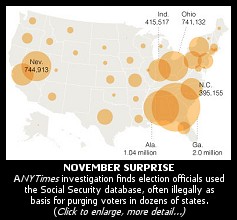 We've been reporting on the GOP's October "Surprise" over the last few days (challenges to Democratic voter registrations in a number of states, and, perhaps more notably, their bogus PR campaign to charge that ACORN, a community organization that heroically registers millions of low-income voters who nobody else bothers to, is committing "voter fraud." See here, here and here, for example.)
We've been reporting on the GOP's October "Surprise" over the last few days (challenges to Democratic voter registrations in a number of states, and, perhaps more notably, their bogus PR campaign to charge that ACORN, a community organization that heroically registers millions of low-income voters who nobody else bothers to, is committing "voter fraud." See here, here and here, for example.)
But the November Surprise, as we've been trying to warn for many months (if not years), will undoubtedly be the thousands who show up to the polls to vote on November 4th, only to find out that they have somehow "fallen off" the voter rolls.
We've urged folks to check their registrations, even if they recently voted in a primary election, to make sure they haven't been purged (info on how to do that quickly in all 50 states, right here).
Late last month, CBS News reported on voter purges occurring in at least 19 states across the country, many of them swing states, naturally.
Today, the New York Times has published a scathing report, based on a detailed investigation revealing that "Tens of thousands of eligible voters in at least six swing states have been removed from the rolls or have been blocked from registering in ways that appear to violate federal law."
We've got to run out to host an hour of "Election Year Special Coverage" right now on KPFK/Pacifica, (guests to include filmmakers Patty Sharaf of Murder, Spies & Voting Lies: The Clint Curtis Story and John Ennis of Free For All!: One Dude's Quest for Democracy), so here are some very notable, must-read excerpts from the Times full report for the moment. So, we may have more thoughts on all of this later today, but for now, please read on!...
...
[B]ecause Democrats have been more aggressive at registering new voters this year, according to state election officials, any heightened screening of new applications may affect their party’s supporters disproportionately. The screening or trimming of voter registration lists in the six states — Colorado, Indiana, Ohio, Michigan, Nevada and North Carolina — could also result in problems at the polls on Election Day: people who have been removed from the rolls are likely to show up only to be challenged by political party officials or election workers, resulting in confusion, long lines and heated tempers.
Some states allow such voters to cast provisional ballots. But they are often not counted because they require added verification.
...
Michigan and Colorado are removing voters from the rolls within 90 days of a federal election, which is not allowed except when voters die, notify the authorities that they have moved out of state, or have been declared unfit to vote.
Indiana, Nevada, North Carolina and Ohio seem to be improperly using Social Security data to verify registration applications for new voters.
In addition to the six swing states, three more states appear to be violating federal law. Alabama and Georgia seem to be improperly using Social Security information to screen registration applications from new voters. And Louisiana appears to have removed thousands of voters after the federal deadline for taking such action.
Under federal law, election officials are supposed to use the Social Security database to check a registration application only as a last resort, if no record of the applicant is found on state databases, like those for driver’s licenses or identification cards.
The requirement exists because using the federal database is less reliable than the state lists, and is more likely to incorrectly flag applications as invalid. Many state officials seem to be using the Social Security lists first.
In the year ending Sept. 30, election officials in Nevada, for example, used the Social Security database more than 740,000 times to check voter files or registration applications and found more than 715,000 nonmatches, federal records show. Election officials in Georgia ran more than 1.9 million checks on voter files or voter registration applications and found more than 260,000 nonmatches.
...
In three states — Colorado, Louisiana and Michigan — the number of people purged from the election rolls since Aug. 1 far exceeds the number who may have died or relocated during that period.
States may be improperly removing voters who have moved within the state, election experts said, or who are considered inactive because they have failed to vote in two consecutive federal elections. For example, major voter registration drives have been held this year in Colorado, which has also had a significant population increase since the last presidential election, but the state has recorded a net loss of nearly 100,000 voters from its rolls since 2004.
...
In Michigan, some 33,000 voters were removed from the rolls in August, a figure that is far higher than the number of deaths in the state during the same period — about 7,100 — or the number of people who moved out of the state — about 4,400, according to data from the Postal Service.
In Colorado, some 37,000 people were removed from the rolls in the three weeks after July 21. During that time, about 5,100 people moved out of the state and about 2,400 died, according to postal data and death records.
In Louisiana, at least 18,000 people were dropped from the rolls in the five weeks after July 23. Over the same period, at least 1,600 people moved out of state and at least 3,300 died.
The secretaries of state in Michigan and Colorado did not respond to requests for comment. A spokesman for the Louisiana secretary of state said that about half of the numbers of the voters removed from the rolls were people who moved within the state or who died. The remaining 11,000 or so people seem to have been removed by local officials for other reasons that were not clear, the spokesman said.
...
On Monday, the Ohio Republican Party filed a motion in federal court against the secretary of state to get the list of all names that have been flagged by the Social Security database since Jan. 1. The motion seeks to require that any voter who does not clear up a discrepancy be required to vote using a provisional ballot.
Republicans said in the motion that it is central to American democracy that nonqualified voters be forbidden from voting.
The Ohio secretary of state, Jennifer Brunner, a Democrat, said in court papers that she believes the Republicans are seeking grounds to challenge voters and get them removed from the rolls.
Considering that in the past year the state received nearly 290,000 nonmatches, such a plan could have significant impact at the polls.
From the sidebar graphic included with the Times story:



 Kamala Rising:
Kamala Rising: Evidence Fails to Establish Attempted Trump Assass-ination Politically Motivated
Evidence Fails to Establish Attempted Trump Assass-ination Politically Motivated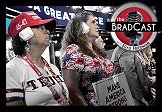 Former MAGA 'Cultist' on the State of the Race for 'MAGA Americans': 'BradCast' 7/23/24
Former MAGA 'Cultist' on the State of the Race for 'MAGA Americans': 'BradCast' 7/23/24  'Green News Report' 7/23/24
'Green News Report' 7/23/24
 Biden Out, Endorses
Biden Out, Endorses BIDEN DROPS REELECTION BID
BIDEN DROPS REELECTION BID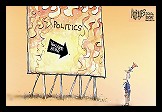 Sunday 'You Are Here' Toons
Sunday 'You Are Here' Toons What J.D. Vance Forgot to Tell You (and Lied About) at the RNC: 'BradCast' 7/18/24
What J.D. Vance Forgot to Tell You (and Lied About) at the RNC: 'BradCast' 7/18/24 'Green News Report' 7/18/24
'Green News Report' 7/18/24 Holding on for Dear Life Amid the Political Whirlwind: 'BradCast' 7/17/24
Holding on for Dear Life Amid the Political Whirlwind: 'BradCast' 7/17/24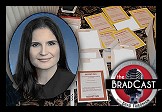 Cannon's Corruption: 'BradCast' 7/16/24
Cannon's Corruption: 'BradCast' 7/16/24 'Green News Report' 7/16/24
'Green News Report' 7/16/24 Amid the Assassination Attempt Aftermath:
Amid the Assassination Attempt Aftermath:
 Meanwhile... : 'BradCast' 7/11/24
Meanwhile... : 'BradCast' 7/11/24 'Green News Report' 7/11/24
'Green News Report' 7/11/24 Paging 'Johnny Unbeatable'! Dems (Actually!) in Disarray!: 'BradCast' 7/10/24
Paging 'Johnny Unbeatable'! Dems (Actually!) in Disarray!: 'BradCast' 7/10/24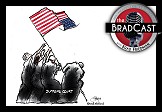 SCOTUS Immunity Ruling 'As Bad as it Sounds', And Worse: 'BradCast' 7/9/24
SCOTUS Immunity Ruling 'As Bad as it Sounds', And Worse: 'BradCast' 7/9/24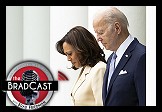 So, What Now?: 'BradCast' 7/8/24
So, What Now?: 'BradCast' 7/8/24 Debunking MAGA Cult Xenophobia
Debunking MAGA Cult Xenophobia A Friendly Suggestion: Harris-Newsom 2024
A Friendly Suggestion: Harris-Newsom 2024 Prosecutor: SCOTUS Corruption Ruling Less Corrupt Than Appears: 'BradCast' 6/27/24
Prosecutor: SCOTUS Corruption Ruling Less Corrupt Than Appears: 'BradCast' 6/27/24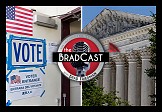 Good News and Bad: At the Polls and From the Corrupted Court: 'BradCast' 6/26/24
Good News and Bad: At the Polls and From the Corrupted Court: 'BradCast' 6/26/24 'Emptywheel' on Assange Hacking, Plea Deal: 'BradCast' 6/25/24
'Emptywheel' on Assange Hacking, Plea Deal: 'BradCast' 6/25/24
 VA GOP VOTER REG FRAUDSTER OFF HOOK
VA GOP VOTER REG FRAUDSTER OFF HOOK Criminal GOP Voter Registration Fraud Probe Expanding in VA
Criminal GOP Voter Registration Fraud Probe Expanding in VA DOJ PROBE SOUGHT AFTER VA ARREST
DOJ PROBE SOUGHT AFTER VA ARREST Arrest in VA: GOP Voter Reg Scandal Widens
Arrest in VA: GOP Voter Reg Scandal Widens ALL TOGETHER: ROVE, SPROUL, KOCHS, RNC
ALL TOGETHER: ROVE, SPROUL, KOCHS, RNC LATimes: RNC's 'Fired' Sproul Working for Repubs in 'as Many as 30 States'
LATimes: RNC's 'Fired' Sproul Working for Repubs in 'as Many as 30 States' 'Fired' Sproul Group 'Cloned', Still Working for Republicans in At Least 10 States
'Fired' Sproul Group 'Cloned', Still Working for Republicans in At Least 10 States FINALLY: FOX ON GOP REG FRAUD SCANDAL
FINALLY: FOX ON GOP REG FRAUD SCANDAL COLORADO FOLLOWS FLORIDA WITH GOP CRIMINAL INVESTIGATION
COLORADO FOLLOWS FLORIDA WITH GOP CRIMINAL INVESTIGATION CRIMINAL PROBE LAUNCHED INTO GOP VOTER REGISTRATION FRAUD SCANDAL IN FL
CRIMINAL PROBE LAUNCHED INTO GOP VOTER REGISTRATION FRAUD SCANDAL IN FL Brad Breaks PA Photo ID & GOP Registration Fraud Scandal News on Hartmann TV
Brad Breaks PA Photo ID & GOP Registration Fraud Scandal News on Hartmann TV  CAUGHT ON TAPE: COORDINATED NATIONWIDE GOP VOTER REG SCAM
CAUGHT ON TAPE: COORDINATED NATIONWIDE GOP VOTER REG SCAM CRIMINAL ELECTION FRAUD COMPLAINT FILED AGAINST GOP 'FRAUD' FIRM
CRIMINAL ELECTION FRAUD COMPLAINT FILED AGAINST GOP 'FRAUD' FIRM RICK SCOTT GETS ROLLED IN GOP REGISTRATION FRAUD SCANDAL
RICK SCOTT GETS ROLLED IN GOP REGISTRATION FRAUD SCANDAL VIDEO: Brad Breaks GOP Reg Fraud Scandal on Hartmann TV
VIDEO: Brad Breaks GOP Reg Fraud Scandal on Hartmann TV RNC FIRES NATIONAL VOTER REGISTRATION FIRM FOR FRAUD
RNC FIRES NATIONAL VOTER REGISTRATION FIRM FOR FRAUD EXCLUSIVE: Intvw w/ FL Official Who First Discovered GOP Reg Fraud
EXCLUSIVE: Intvw w/ FL Official Who First Discovered GOP Reg Fraud GOP REGISTRATION FRAUD FOUND IN FL
GOP REGISTRATION FRAUD FOUND IN FL


































